Aluminum skin sheets, also known as aluminum skin panels or aluminum exterior sheets, are commonly used for the exterior cladding of trailers and RVs. These sheets provide a durable yet lightweight solution to protect the trailer's structure and improve its appearance. Here are some details about trailer aluminum skin panels:
- Alloy: Aluminum Skin Sheets for Trailer are typically made from alloys such as 3003 or 5052, which provide a good balance of strength, formability, and corrosion resistance.
- Temper: Sheets are usually in H14 or H32 temper, which offer a good combination of workability and strength.
- Gauge: Aluminum skin panels for trailers come in a variety of thicknesses, typically between 0.024 and 0.040 inches (0.6 and 1.0 mm). Sheet dimensions may vary by specific trailer and manufacturer.
- Surface treatment: Boards are usually given a satin finish, that is, a smooth, untreated surface. However, they can also be coated with paint or other finishes for added protection and aesthetics.
- Common Uses: Aluminum skin panels are widely used in the construction of trailers, including carriage trailers, cargo trailers, travel trailers, and recreational vehicles (RV). They are applied to trailer exterior walls, roofs and sometimes even floors to provide protection from the elements and road debris.
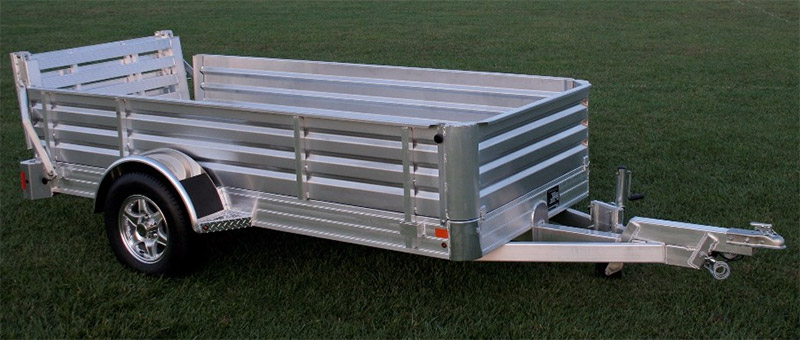
The specific alloy, temper, thickness and dimensions of aluminum skin panels for trailers may vary by trailer manufacturer and design requirements. It is recommended to consult with the trailer manufacturer or supplier to ensure you are selecting the proper aluminum skin panel for your trailer project.
What Type of Aluminum is Used for Trailers?
Aluminum alloys commonly used for trailers include 5052, 5083 and 6061. The following are the classifications of these alloys and their properties:
5052 Aluminum Skin Sheets for Trailer
Alloy 5052 is known for its excellent corrosion resistance, making it a popular choice for trailer applications.
- Al 5052 has good formability and weldability, and is easy to manufacture.
- 5052 aluminum is commonly used for trailer exterior panels such as side walls and roofs.
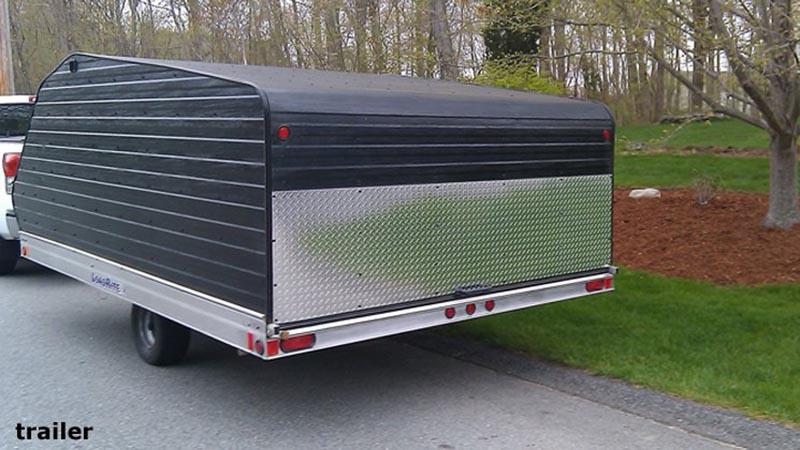
5083 Aluminum Skin Sheets for Trailer
Alloy 5083 is highly resistant to corrosion in marine environments, making it suitable for use in coastal areas or on trailers exposed to salt water.
- Al 5083 has high strength and excellent weldability.
- 5083 aluminum is commonly used in trailer frames, especially boat trailers or trailers for heavy-duty applications.
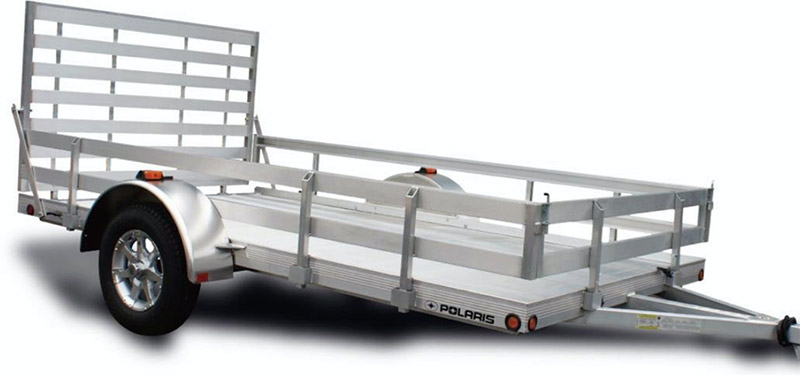
6061 Aluminum for Trailer
Alloy 6061 has a good balance of strength, formability, and corrosion resistance.
- Al 6061 has excellent weldability and machinability allowing for versatility in trailer manufacturing.
- 6061 aluminum is commonly used for trailer components such as frames, ramps and structural elements.
The choice of aluminum alloy for a trailer depends on factors such as the trailer's intended use, required strength, corrosion resistance requirements, and manufacturing considerations. It is recommended to consult the trailer manufacturer or supplier to determine the most suitable aluminum alloy for your particular trailer application.
What Gauge Aluminum is Used on Trailers?
The gauge (or thickness) of aluminum used on a trailer may vary depending on the specific trailer type, application and design requirements. However, there are some common gauge ranges used in the industry. Here are some examples:
-
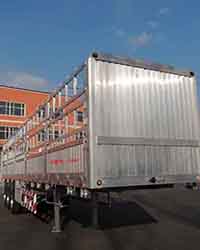 Aluminum Skin Sheets for Trailer
Aluminum Skin Sheets for TrailerFor the exterior walls and roof of trailers, aluminum specifications typically range from 0.024 to 0.040 inches (0.6 to 1.0 mm). Thicker gauges, such as 0.040 inches, are often used for added durability and protection.
-
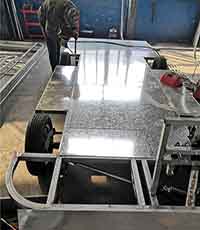 Frame and Structural Components
Frame and Structural ComponentsAluminum specifications for trailer frames and structural components may vary depending on trailer size, load capacity and intended use. For heavy trailers, common gauges range from 0.125 to 0.25 inches (3.2 to 6.4 mm).
-
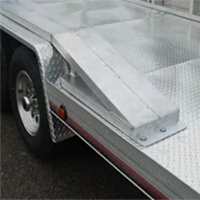 Aluminum Sheets for Trailer Floor
Aluminum Sheets for Trailer FloorAluminum specifications for trailer floors will also vary depending on the trailer's use and expected load. Typical gauge range is 0.080 to 0.125 inches (2.0 to 3.2 mm).
It is important to note that the exact size used will also depend on regional regulations, industry standards, and trailer manufacturer preference. Consultation with trailer manufacturers, suppliers or industry experts is recommended to determine the appropriate aluminum specification for your specific trailer requirements.
What Gauge Sheet Metal for Trailer Sides?
Sheet metal specifications for trailer sides can vary depending on the trailer's size, load capacity, and intended use. However, there are some common gauge ranges used in the industry. Here are some examples:
-
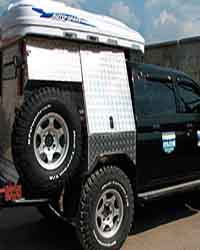 Lightweight Trailers
Lightweight TrailersFor smaller lightweight trailers, such as utility trailers or small enclosed trailers, the sheet metal gauge used for the sides is usually 14 to 18 gauge. This means a thickness range of approximately 0.075 to 0.048 inches (1.9 to 1.2 mm).
-
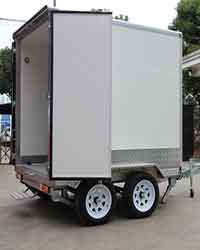 Medium Trailers
Medium TrailersFor medium trailers, such as larger enclosed trailers or cargo trailers, the sheet metal gauge used for the sides is usually in the 12 to 14 gauge range. This corresponds to a thickness range of approximately 0.104 to 0.075 inches (2.6 to 1.9 mm).
-
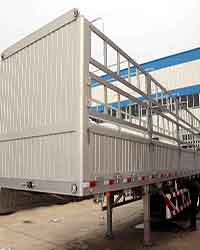 Heavy-duty trailers
Heavy-duty trailersFor heavy-duty trailers, including flatbed trailers, car carriers, or equipment trailers, the sheet metal gauge used for the sides ranges from 10 to 12 gauge. This equates to a thickness ranging from approximately 0.134 to 0.104 inches (3.4 to 2.6 mm).
It is important to note that the specific specifications used for trailer sides may vary based on regional regulations, industry standards, and trailer manufacturer preferences. Also, some trailers may use multiple gauge sheet metal, with heavier gauge material in high stress areas or where extra strength is needed.
Where to Get Aluminum Sheets for Trailers
Haomei Aluminum is a reputable and reliable trailer aluminum plate manufacturer that can meet your specific requirements and provide high quality aluminum plate.
- Experience and expertise: The manufacturer should have extensive experience in producing aluminum panels for trailers. Gain an in-depth understanding of the different aluminum alloys, their properties, and their suitability for trailer applications.
- Quality Control and Certification: Having a robust quality control system ensures consistent production of high quality aluminum sheet. Follow strict quality standards, such as ISO certification, and conduct regular inspections and tests to verify the characteristics and performance of materials.
- Aluminum Range: Offers a range of aluminum alloys suitable for trailer applications. This includes alloys with suitable strength, corrosion resistance and formability properties. Ability to provide custom alloy specifications for specific trailer requirements.
- State-of-the-Art Facility: The manufacturer has a modern and well-equipped aluminum sheet production facility. Including advanced machinery for casting, rolling, heat treatment and finishing processes. State-of-the-art facilities contribute to consistent quality, precision and manufacturing efficiency.
- Customization and Flexibility: Manufacturers are able to accommodate customization requests to meet specific trailer design requirements. This includes offering a variety of sheet thicknesses, widths, lengths and surface finishes.
- Timely delivery and reliable supply chain: Have a reliable and efficient supply chain to ensure timely delivery of aluminum sheets.
- Customer Support and Service: Provides excellent customer support, including technical assistance, a dedicated customer service team to handle inquiries, resolve issues, and provide after-sales support.

